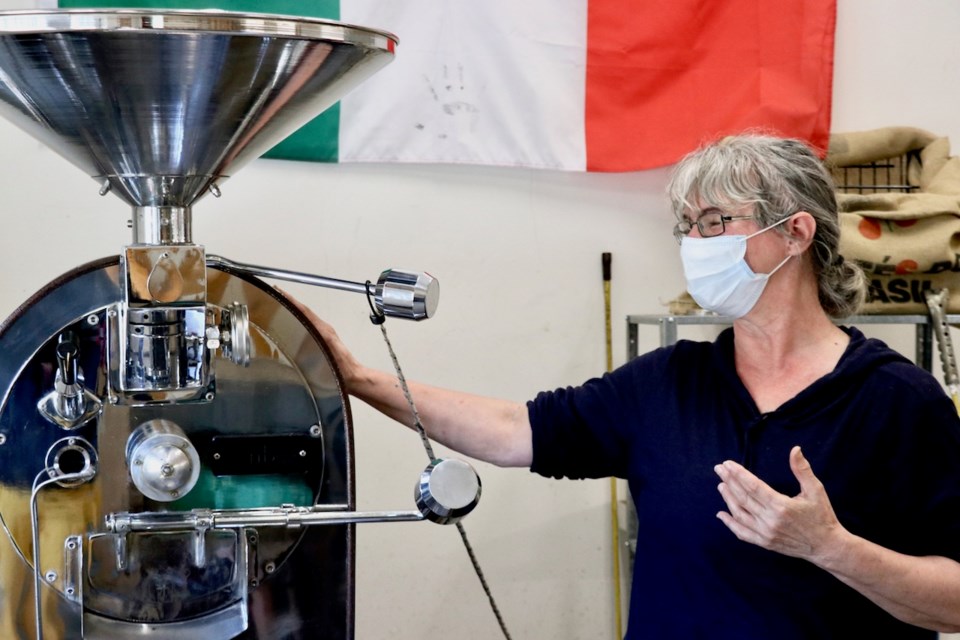When Bowen Island Espresso Hut closed its doors in mid-March as the threat of COVID grew in B.C., Chiara Perin didn’t know it was for the last time.
Perin had closed as a pandemic precaution after talking to her sister in Italy when the country was at the pandemic’s peak. “The way that she depicted the situation ––I knew that we had to close,” recalled Perin.
Within days of Perin’s decision, most other business on the island shuttered. But unlike some that continued with take-out or that are now starting to reopen, the hut’s situation became permanent.
Before COVID, Perin had been trying to sell the hut business, but after the pandemic hit, unable to see profit through the lack of tourism and the months’ rent while closed, she made the decision to let it go.
Hope isn’t lost, however, for those who can’t go without their Bowen cup of joe.
Perin kept the roasting business she operates in the space behind the hut (it’s a separate unit).
“I’m still figuring out how it’s doing,” she said. “I’m afloat. I’m going to be able to pay the rent.”
And while letting the hut go is sad, it’s not the first time Perin’s been through such an ordeal.
The islander sees the economic parallels with the 2008 market crash, when she was a home and business owner in California.
At the time, Perin and her then-husband ran a small computer animation company and had projects lined up for five years, and then everything collapsed.
“It all went dry,” she said.
“There were millions of homes that got foreclosed,” said Perin. “One was mine.”
The family moved to Canada in a bid to save their home—a battle that involved litigation against the bank and that affected both Perin and her children’s mental and physical health.
“We decided to, to let it go,” said Perin.
“It was our life,” said Perin, “but it wasn’t worth our health.”
In L.A. the family had lived in Topanga Canyon for more than two decades, so moving to a city was undesirable, but it was Island Discovery Learning Community attracted Perin specifically to Bowen.
“I was homeschooling the boys not knowing if we were going to move, just so that I didn’t have to pull them out of school in the middle of the school year,” she said. To continue with semi-homeschooling, they chose IDLC. “[Allan Saugstad] had the perfect program and the community there was just the right choice.”
“It worked out really well and it was really healing for all of us,” she said. “The first few years I felt like I was licking my wounds the corner.”
Perin bought the espresso hut from the Rutiglianos nearly three years ago. Subsequent to acquiring the dock-adjacent business, the family lost the house they’d had and so Perin and her two boys have moved four times in the years since. A struggle for housing that continues today.
But when it comes to the businesses, Perin prefers pragmatism.
“Losing the front––it’s ok,” she shrugged. Perin said the hut was fun to do––to have her kids involved, to work with her employee Suzanne, to meet people.
“There’s true value there. Aside from the money, there’s a there’s a value of learning something that I had never done before.”
“I knew the I was risk taking and I knew it was a risk that I could absorb.”
For her business that remains, Perin said she’s lost some roasting revenue from Doc Morgan’s closure (the restaurant went to take-out only), but she wasn’t supplying any of the other cafes or restaurants with coffee, so their closures didn’t affect her bottom line. She’s selling wholesale and has quite a few customers on the island.
To be able to expand and continue the roasting business, Perin’s thinking of perhaps taking on a partner or an employee. But nothing’s set in stone.
“I’m trying to make plans that are no longer than six months because I don’t think I can make long term plans right now,” she said, noting the economic uncertainty that echoes what she saw a decade ago.
But Perin is looking for what comes next for the community. She remembers the societal trauma of 2008 and before that, 2001. “How do we keep supporting everybody, each other, and all that so you know for work and for business and for the community,” she asks. “What does that look like?”
The ambiguity with reopenings and regulations has her concerned about what happens when the adrenaline’s faded.
“This is almost tougher than it was back in March, as far as decisions and organizations in the community and how do we work now together.”



